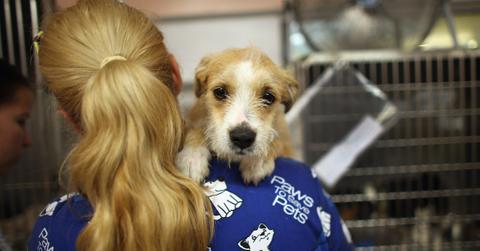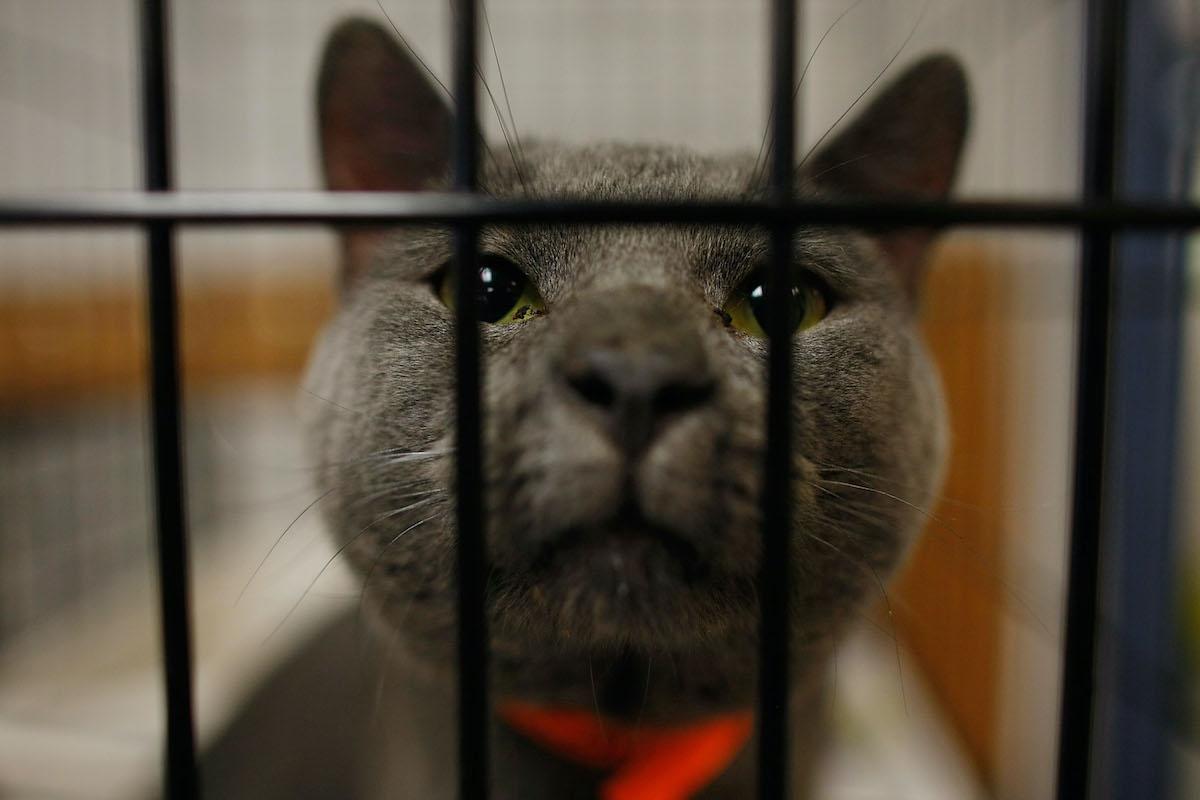With the World Reopening, People Are Surrendering Their “Pandemic Pets”
Published May 11 2021, 12:45 p.m. ET

In the early months of coronavirus lockdowns, a lot of people found themselves with extra time at home — leading many to finally welcome a dog or cat into their family. But unfortunately, with lockdown restrictions lifting in many countries, many are surrendering and rehoming their “pandemic pets.”
In fact, various animal shelters are reporting increased rates of people surrendering their dogs and cats in the spring of 2021. The pet abandonment statistics are quite shocking — but if you did get a pet during the pandemic that you can no longer handle, is there an ethical way to rehome them?

People are abandoning their pets as COVID lockdowns ease.
As reported by Glamour, the RSPCA finds that people are abandoning about 40 pets every day in England and Wales as of the spring of 2021— and multiple shelters have observed this increase in pet surrenders firsthand.
For instance, in March 2020, Battersea Dogs & Cats Home, a shelter with three locations across the U.K., was able to find homes for almost every animal they had within a few weeks. But in the spring of 2021, as England opened back up, Battersea has seen the amount of surrendered cats and dogs double over the course of a few months, Euronews reported.
Ashley Roberts of Lucky Dog Animal Rescue in Maryland also observed a spike in pet adoptions early on in the pandemic, due to so many people working from home or having freer schedules, as she explained to BBC News. However, that has changed in the past few months.
“We in the past couple of months have definitely seen some more returns,” Roberts said in May 2021, adding that over the past month, there was almost double the amount of animals in the shelter as there was in January of this year.
Why are people returning pandemic pets?
There are many reasons people surrender their dogs and cats — and pandemic restrictions lifting is a key reason for pet returns this year.
For instance, Kate Collins of Battersea explained to Euronews that many people who have returned animals to the shelter over the past few months “said that they can no longer keep their animals because of financial aspects, [such as] redundancies and job losses.”
Collins added that the adoption process looked a lot different early in the pandemic, since Battersea’s shelters were temporarily closed to visitors, who had to adopt animals without getting to do a traditional in-person visit first. Not having gotten to properly get to know a dog or cat before taking them home could have made for a few incompatible matches.
Peter Laurie of Battersea noted that many people are now returning to offices and taking vacations, and subsequently realizing a dog doesn’t fit into their new social lifestyles. “A lot of people bought puppies very early on in the pandemic,” he added, as per Euronews. “Those puppies will have grown into adult dogs now. And some of those behaviours may be becoming a little bit more challenging now. People may be thinking now that it's getting too difficult.”
“Sometimes people also don’t really think through or understand how serious that commitment is of taking care of a life, whether it’s a dog or cat, and that stress is a little too much for them, so they’re also returned for that reason,” Roberts told BBC News.
Surrendering dogs and cats can be stressful for the animals.
It’s important to remember that dogs and cats are sentient beings who want to experience love, family, and security just like humans do. Surrenders can be really difficult on the animals, who do not understand why their family has suddenly left them and handed them over to a shelter.
“It is so hard for [the dogs who get returned]. They get used to a routine pretty quickly, they get used to the family, they get used to their space,” Roberts told BBC News. “So to be brought to a new place, typically in a carrier or put into a crate, brought in by strangers, have all these changes, their leash, their collar, their ID tag, watch their humans walk away from them, and then go in to a brand new home — which arguably will be very comfy and safe and cozy because it’s a foster … it’s really scary for them.”
Not only are surrenders hard for the animals, but they also put additional strain on the shelters, which need more resources — money, food, space, volunteers, foster parents, and more — for each animal they have to take in.
How to rehome a dog or cat respectfully
If you or someone you know is having issues with their pet and is considering rehoming them, there are a few ways to make the process more respectful to the animal and anyone else involved.
Before rehoming, consider hiring a trainer if your pet’s behavior is part of the reason you don’t want them anymore. Additionally, the Humane Society of the United States (HSUS) recommends bringing pets with behavioral issues to the vet to see if a medical problem is causing the behavior.
If the issue is that you’ve returned to your office and cannot afford a dog walker, ask your boss if you can bring your pet to work, or consider going home at lunch to walk your dog.
If keeping your dog or cat is not an option for you, HSUS recommends working to rehome your pet on your own — post flyers around town, post on social media, and ask shelters and rescue groups to help you advertise. HSUS says that surrendering your pet to a shelter or rescue group should be a last resort. However, if you wind up doing this, consider donating to the organization as a thank you. Also, make sure it's a no-kill shelter, as euthanizing a perfectly healthy animal would be heartbreaking.
But to avoid ever having to rehome a pet, make sure to do all the necessary research and budget projections before actually welcoming a pet into your family to make sure you are prepared to handle — and love — the animal for the rest of their life. And of course, always adopt, don’t shop — which is easier than ever right now, since there are so many pets being surrendered to shelters.